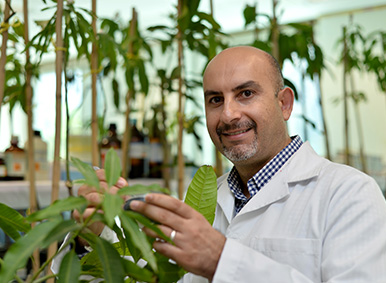Dr. Synan AbuQamar
Tue, 3 July 2018
Associate Professor, Department of Biology
 To make a positive impact on someone's life; values, dedication, opinion and productivity
are the key! With these words, Dr. Synan AbuQamar climbed the academic ladder to become
an Associate Professor at the Department of Biology in the United Arab Emirates University
(UAEU) since 2014. Dr. AbuQamar completed his Ph.D. from Department of Botany & Plant
Pathology/Purdue University in 2007. Following his Ph.D., Synan pursued as a postdoctoral
fellow in the laboratory of Prof. Tesfaye Mengiste at Purdue University. In 2008,
he joined the Department of Biology at UAEU as an Assistant Professor.
To make a positive impact on someone's life; values, dedication, opinion and productivity
are the key! With these words, Dr. Synan AbuQamar climbed the academic ladder to become
an Associate Professor at the Department of Biology in the United Arab Emirates University
(UAEU) since 2014. Dr. AbuQamar completed his Ph.D. from Department of Botany & Plant
Pathology/Purdue University in 2007. Following his Ph.D., Synan pursued as a postdoctoral
fellow in the laboratory of Prof. Tesfaye Mengiste at Purdue University. In 2008,
he joined the Department of Biology at UAEU as an Assistant Professor.
Since then at UAEU, Synan has established a Plant Molecular Genetics/Plant Biotechnology laboratory at the Department of Biology. His current research area is Molecular Genetics of Plant Immunity. His research focuses on understanding the molecular and cellular factors that control plant defense mechanisms against necrotrophic pathogens – pathogens that kill host tissues/cells to complete their life cycle- using “model” and “crop” host plants. As a translational scientist, Dr. AbuQamar has been able to take forward his basic research using genomics, transcriptomics and gene functional approaches to agricultural and field applications, and back to the lab to know more about basic science. The ultimate goal is to substantially reduce the devastating impact of diseases on plants.
In the UAE, as in other countries in the world, plants fight to survive harsh environmental stresses, including plant pathogens. Synan is striving to improve plant resistance to pathogens/diseases. Traditional horticultural and chemical practices have proven their limitations, or even negative impacts on the environment and human health. Therefore, genetic engineering and biological control can limit the increases of pathogen populations, and often suppress the plant tissue destroying activities of pathogens. In his lab, Synan has extensively been concerned about the plant-microbe interaction, including Arabidopsis thaliana-Botrytis cinerea, date palm-Thielaviopsispunctulata and mango-Lasiodiplodia theobromae pathosystems. For example, B. cinerea is considered the second most important fungal pathogen worldwide that causes diseases in a wide range of crops. T. punctulata and L. theobromae causing black scorch disease (locally known as Medjnoon) on date palm and dieback disease on mango; respectively, negatively affect the agribusiness in the UAE.
Dr. AbuQamar’s lab has efficiently limit chemicals use on plants. So far, the lab has generated several mutations in genes and discovered many biocontrol agents for a highly effective solution against these “nasty” fungi. All research findings are the result of research projects carried out by Dr. AbuQamar’s team including M.Sc. and Ph.D. students. Synan has published over 50 publications in highly impact international journals. This is evident that American Society of Plant Biologist (ASPB) has recognized Synan being one of the most highly cited author in “Plant Cell” and “Plant Physiology” journals published between 2009-2013 in the Middle East and Africa. In addition, he has been recognized in several occasions by UAEU as a “distinguished researcher” with publication in top ranked journals. In 2017, he was awarded the College of Science Award for Excellence in Scholarship.
Synan is married and has one son, Hamzeh, and one daughter, Juwan. Synan enjoys reading, football and traveling.
Do you find this content helpful?
عفوا
لايوجد محتوى عربي لهذه الصفحة
عفوا
يوجد مشكلة في الصفحة التي تحاول الوصول إليها

